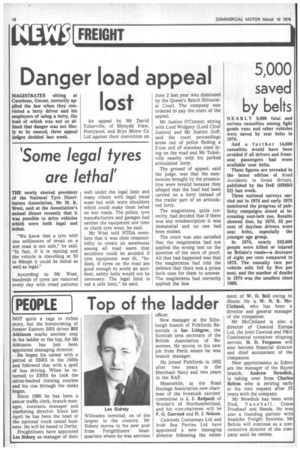'Some legal tyres are lethal'
Page 18

If you've noticed an error in this article please click here to report it so we can fix it.
THE newly elected president of the National Tyre Distributors Association, Mr M. K. West, said at the Association's annual dinner recently that it was possible to drive vehicles which were both legal and lethal.
"We know that a tyre with one millimetre of tread on a wet road is not safe," he said. "In fact, if it is raining and the vehicle is travelling at 50 to 60mph it could be lethal as well as legal."
According to Mr West, hundreds of tyres are removed every day with tread patterns well under the legal limit and many others with legal tread wear but with worn shoulders which could make them lethal on wet roads. The police, tyre manufacturers and garages had neither the equipment nor time to check tyre wear, he said.
Mr West told NTDA members that it was their responsibaty to create an awareness among all road users that accidents could be avoided if tyre equipment was fit. "Indeed, if tyres on the road are good enough to avoid an accident, safety belts would not be necessary. The legal limit is not a safe limit," he said. June 2 last year was dismissed by the Queen's Bench Divisional Court. The company was ordered to pay the costs of the appeal.
Mr Justice O'Connor, sitting with Lord Widgery (Lord Chief Justice) and Mr Justice Goff, said the court proceedings arose out of police finding a 5-ton coil of stainless steel lying on the road and Mr Tuberyule nearby nearby with his parked articulated lorry.
The ground of appeal, said the judge, was that the summonses brought by the prosecution were invalid because they alleged that the load had been carried on a lorry instead of the trailer part of an articulated lorry.
The magistrates, quite correctly, had decided that if there was any misdescription it was immaterial and no one had been misled.
The court was also satisfied that the magistrates had not applied the wrong test on the question of the onus of proof. All that had happened was that the magistrates had told the defence that there was a prima facie case for them to answer. The magistrates had correctly applied the law.








































































































